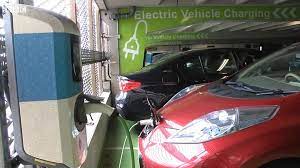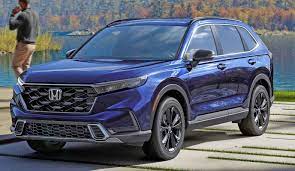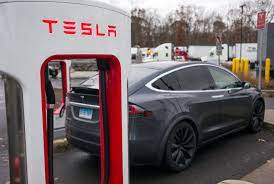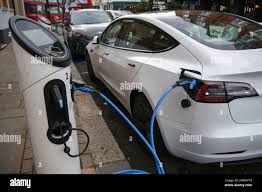Electric Vehicle (EV) is a vehicle with an electric motor instead of a conventional engine. Electric cars have been around for more than 100 years, but the technology has advanced greatly in recent years. Today’s EVs can travel farther and faster than ever before!
What is EV?
Electric Vehicle (EV) is an eco-friendly vehicle that runs on electricity. It is also known as a battery powered vehicle because it uses a rechargeable battery. Most EVs do not need to be plugged in; they have a very long range per charge and can be recharged using standard household current. Read Also: Major Reasons for Electric Vehicles
How long can an electric car go on one charge?
There is no fixed answer to this question, as it depends on a lot of factors: the battery size, the weight of the car and so on. For example, if you have an electric car with a 100 kWh battery pack (like Tesla Model S P100D) that weighs around 2 tons, then you can travel more than 400 miles at highway speed. If you drive your Nissan Leaf or BMW i3 in city traffic with lots of stops and starts (as most cars are used), then your mileage will drop significantly.
What is the difference between range and charge?
The term “range” refers to the distance you can travel on a single charge. The term “charge” refers to the amount of electricity that is put into the battery.
Because range depends on factors such as battery capacity, battery voltage and driving conditions, there are several ways to measure it; one common way is by measuring how many miles you can drive before your car needs recharging. Another common method is to calculate how much power (in watts) your vehicle will need at different speeds or road grades so that you know how much energy must be generated by its motor/generator. Similarly, charging rate depends on things like the size of your charger and whether it’s connected directly to an outlet or through an extension cord (which slows down charging).
How much does it cost to charge an electric car?
The cost of charging an electric car depends on the type of car, the type of charger and the cost of electricity. The cost also varies depending on whether you charge at home or at a public charging station. Read Also: Tips on the Cheapest Electric Vehicle
The good news is that electric cars are cheaper to run than petrol cars. However, it’s still important to consider whether your usage patterns are suitable for an electric vehicle before investing in one: if you drive a lot then it might not be worth paying more just so you can plug your car into the grid rather than fill up at a petrol station.
Electric Vehicle can go on one charge
The answer to the question of whether or not an electric car can go on one charge is yes. In fact, a well-maintained electric vehicle can go on one charge as long as it is not a sport utility vehicle or truck.
It is important to note that this depends on the type of vehicle you are driving and how far you drive. For example, if your car has a small battery capacity then it may not be able to reach your destination without charging at least once. However, if your car has a large battery capacity then it could probably reach its destination without recharging; this will depend on where you are going and how fast you are driving!
The type of battery also plays an important role in determining how long an electric vehicle can go without recharging before needing to stop at another location with power outlets so that drivers won’t run out during their journey across town with family members who want ice cream cones from Dairy Queen after dinner tonight because it’s been such hot weather lately…
Also, electric cars are an exciting prospect. They’re better for the environment, they’re quieter than gas-powered cars, and they have other advantages over traditional vehicles. However, there’s one problem that keeps us all from buying electric cars in droves: they don’t go very far on a single charge. This can be frustrating when you’re driving somewhere with no charging stations nearby! In this article we’ll take a look at why electric cars have such limited range and what may be done about it by auto manufacturers in the future
Not very far on a single charge.
Electric cars have a limited range, and the distance you can go on a single charge depends on the type of car.
The range of an electric car varies from model to model, but most electric cars can travel about 100 miles or less before needing to be recharged. The Tesla Model S, for example, has a starting price tag of $69,500 and has a range of roughly 300 miles per charge—well above what many other electric vehicles can offer. This makes it ideal for long trips by yourself or with a group (you won’t need to stop every few hours) but not so useful if you need to make frequent stops while driving around town.
The cost and fuel efficiency are two major factors that come into play when deciding whether an EV is right for your needs: EVs are more expensive than comparable gas-powered vehicles; however they require fewer maintenance costs over their lifetimes than conventional cars do (they don’t burn gasoline).
The problem is that most people need to go 300 miles or more between charges.
The problem is that most people need to go 300 miles or more between charges. That’s where electric cars start to fall apart.
I’ve been driving a hybrid car for years now and wouldn’t dream of buying anything else—but as far as I can tell, it would never make sense for me (or anyone who lives in an urban area) to own an electric vehicle instead of a gas-powered one because it seems like such an impractical way of getting around town!
It means they need to recharge at least one or two times on a trip.
It is important to note that an electric car cannot drive more than 300 miles on a single charge. This means that they need to recharge at least once or twice on a trip. But charging is not as simple as filling up your tank with gas; it is expensive, and there are fewer stations than gas stations in most places.
Charging an electric vehicle costs about $1 per mile of driving. That’s about four times more than fueling up your old car! The cost of charging varies depending on where you live and what type of charger you use (public vs private).
It is an inconvenience, and it’s expensive—it costs about $30 to recharge in most places.
If you have a charger at work, that’s one less thing to worry about. But if you have to pay for the electricity, it adds up fast: If your commute takes 30 minutes with charging breaks every five miles that means you’ll be spending $0.66/mile (assuming electricity is $0.10/kWh). That’s a lot more than what most people pay for gas!
That is probably one of the biggest factors holding back electric cars right now.
One of the biggest factors holding back electric cars today is battery technology. It’s not good enough to meet consumer needs, and it will take time before it is.
The problem with batteries is that they’re expensive, heavy, and can be damaged easily by heat or cold. This makes them a challenge for car manufacturers who want to make affordable vehicles that can go long distances without stopping for hours at a time—and aren’t worried about what happens if someone leaves their keys in the ignition while an AC unit is running full blast in summer heat outside.
However, all these issues are being worked on by scientists who study this kind of thing all day every day (which means we don’t have to). With more research into battery technology comes better ways to store power from solar panels or wind turbines so that you’ll never run out when driving around town looking for lunch options because none of them serve vegan food with avocado toast (my personal nightmare).
The auto industry could solve this problem with better battery technology.
A battery’s capacity to hold energy is measured in kilowatt-hours (kWh), a unit of energy equal to the work done by a power of 1,000 watts for one hour. The more kWhs a battery can store at a given time, the farther it can go before running out of juice. An electric vehicle’s range depends on how much power its motor consumes and how much energy its batteries are capable of holding.
But while we’re waiting for Tesla Motors’ promised “gigafactory” in northern Nevada to start mass producing lithium-ion batteries with over 80 kWh capacities per pack by 2020, there are other ways we can extend an EV’s range without upgrading your car’s hardware or firmware:
Conclusion
In conclusion, we’d like to say that electric cars are great for any type of driver. They are good for the environment and they can save you money in the long run. Once the battery technology is improved, it will be much easier for electric cars to go on just one charge. This will make it more convenient and less expensive than gas-powered cars.







